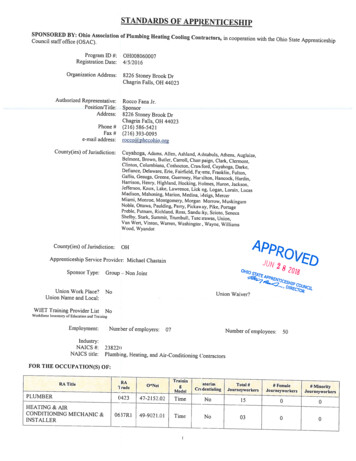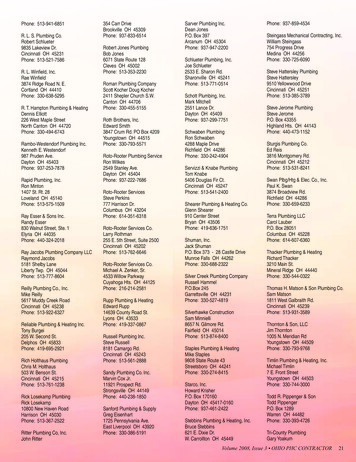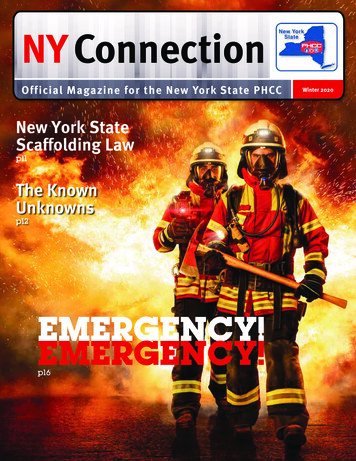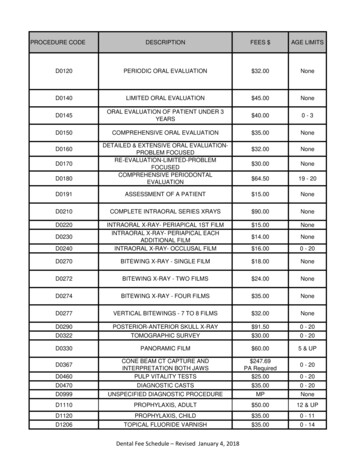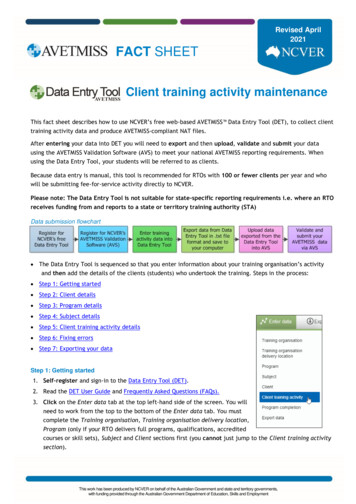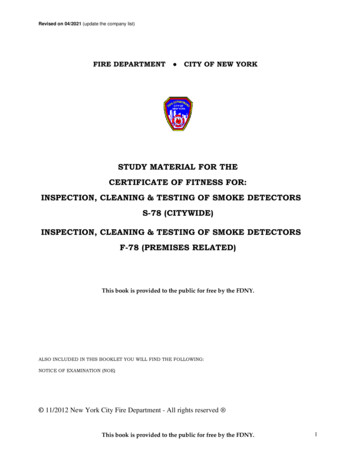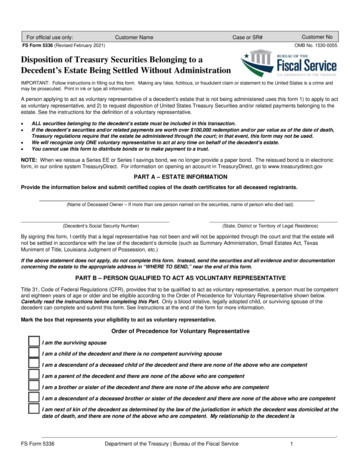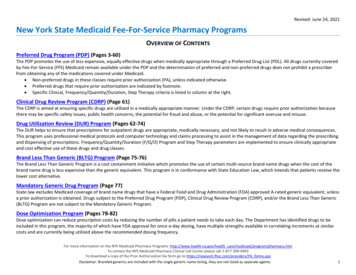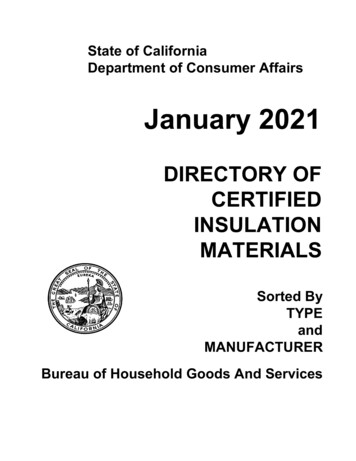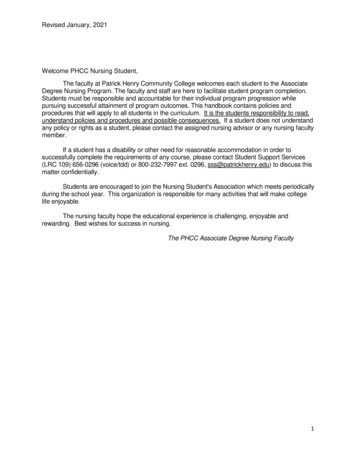
Transcription
Revised January, 2021Welcome PHCC Nursing Student,The faculty at Patrick Henry Community College welcomes each student to the AssociateDegree Nursing Program. The faculty and staff are here to facilitate student program completion.Students must be responsible and accountable for their individual program progression whilepursuing successful attainment of program outcomes. This handbook contains policies andprocedures that will apply to all students in the curriculum. It is the students responsibility to read,understand policies and procedures and possible consequences. If a student does not understandany policy or rights as a student, please contact the assigned nursing advisor or any nursing facultymember.If a student has a disability or other need for reasonable accommodation in order tosuccessfully complete the requirements of any course, please contact Student Support Services(LRC 109) 656-0296 (voice/tdd) or 800-232-7997 ext. 0296, sss@patrickhenry.edu) to discuss thismatter confidentially.Students are encouraged to join the Nursing Student's Association which meets periodicallyduring the school year. This organization is responsible for many activities that will make collegelife enjoyable.The nursing faculty hope the educational experience is challenging, enjoyable andrewarding. Best wishes for success in nursing.The PHCC Associate Degree Nursing Faculty1
Revised January, 2021Table of ContentsPHCC College Mission. 3PHCC School of Nursing Philosophy . 3Program Outcomes . 4Graduate Student Learning Outcomes . 4Approval and Accreditation . 6Nursing Program Guidelines . 7Professional Behavior . 7Health . 7Grades. 8Student Clinical Responsibilities . 10Dress Code . 10Student Behavior . 12Clinical Simulation Lab Expectations . 12Nursing Program Policies. 13Integrated Testing Policy (Kaplan) . 13Drug Dosage Competency Policy . 13Clinical Incompetence Policy and Procedure . 13Drug and Alcohol Policy . 16Academic Integrity Policy for Nursing . 17Progression and Retention Policies . 17Non-Academic Suspension (from Nursing) . 18Academic Suspension (from Nursing) . 18Retention/Readmission Polices and Procedure . 19Non-Academic Suspension: Readmission Form (NSG-1) . 20Academic Suspension: Readmission Form for Nursing Course Failure (NSG-2) . 21Academic Suspension: Readmission General Education Course Failure Form (NSG-3) . 23Program Related Policies . . . 25Inter-program Transfer Policy . 25Social Media/ Networking/Technology Policy . 26Miscellaneous Program Information . 27Nursing Department Office/ Nursing Program Director Assistance . 27Nursing Faculty Assistance/Advising/Inquires . 27Class Officers . 27The Nursing Student Association . 28Estimated Financial Requirements . 28Pinning Ceremony Guidelines . 29PHCC Policies . 29Student Disability Policy . 29Inclement Weather Policy . 29Appendix A- Guidance Document Virginia Board of Nursing . 30Additional Copies of Nursing Forms . 402
Revised January, 2021PHCC College Vision, Mission, and ValuesVision: Student success IS Patrick Henry Community College.Mission: PHCC is a comprehensive community college committed to enriching the quality of lifein its service region through academic excellence, student success, workforce development,community engagement, and lifelong learning.Values: PHCC values excellence, innovation, diversity, and continuous improvement. Wedemonstrate these values in the following ways: Teaching and LearningTeaching and learning are paramount at PHCC and simply the heart of everything we do. Integrity and RespectOur people are our most valuable asset. To promote a culture of integrity and respect forstudents and employees, PHCC develops, nurtures, and sustains an engaged, diverse, andtalented workforce. Communication and CollaborationWe effectively communicate and collaborate with both internal and external stakeholders.Furthermore, we seek to foster relationships and build partnerships that enhance thesuccess and quality of life of all constituents.PHCC Mission and Nursing Program PhilosophyMission of the VCCS Nursing Programs is to provide affordable, community access to qualitynursing education. The VCCS nursing programs prepare qualified students to provide safe,competent, entry-level nursing care in 21st century healthcare environments. Students areprepared to meet the ever-increasing complexity of the healthcare needs of the citizens ofVirginia.Philosophy: VCCS nursing faculty ascribe to the core competencies for nursing and nursingeducation. While firmly based in science and the arts, the essence of nursing is caring andcompassionate patient centered care. Ethical standards, respect for individual dignity, andconsideration of cultural context are implicit in the practice of patient centered care. The nurseadvocates for patients and families in ways that promote self-determination, integrity, andongoing growth as human beings. Nursing care is provided in collaboration with the patient, thefamily and members of the health care team. The nurse displays a spirit of inquiry by examiningevidence to improve quality of care, promote safety and improve patient outcomes. Nursingjudgment is integral to making competent decisions related to the provision of safe and effectivenursing care. Information management essential to nursing care is communicated via a varietyof technological and human means.3
Revised January, 2021Program OutcomesEighty percent of all program graduates will pass the NCLEX-RN licensing exam as first timetest takers within 12 months of program graduation.Sixty-five percent of students of who start the first semester of clinical courses will graduatewithin 150% of the program length.Ninety percent of graduates seeking employment will indicate working in the field as an RNwithin in six months of graduation.One hundred percent of graduating students will receive a satisfactory grade at the conclusionof the clinical experience.Student Learning (Graduate) OutcomesStudent Learning Outcomes:Students who complete the Associate Degree of Applied Science with a major in Nursing will beexpected to:1.Provide patient centered care promoting therapeutic relationships, caring behaviors, and selfdetermination across the lifespan for diverse populations.2.Practice safe nursing care that minimizes risk of harm across systems and client populations.3.Demonstrate nursing judgment through the use of clinical reasoning, the nursing process, andevidence-based practice in the provision of safe, quality care.4. Practice professional behaviors that encompass the legal/ethical framework whileincorporating self-reflection, leadership and a commitment to recognize the value of life-longlearning.5.Manage client care through quality improvement processes, information technology, and fiscalresponsibility to meet client needs and support organizational outcomes.6.Demonstrate principles of collaborative practice within the nursing and interdisciplinary teamsfostering mutual respect and shared decision-making to achieve stated outcomes of care.Student Learning Outcomes with Competencies1. Provide client centered care promoting therapeutic relationships, caring behaviors,and self-determination across the lifespan for diverse populations.a. Coordinate client centered care delivery with sensitivity and respect.b. Evaluate the effectiveness of teaching plans and outcomes and revise forachievement of desired outcomes.c. Promote client self-determination in making healthcare decisions as a level 4student.d. Integrate therapeutic communication skills when interacting with clients and theclient’s support network.e. Advocate independently for diverse individuals, families, and communities across thelifespan.4
Revised January, 20212. Practice safe nursing care that minimizes risk of harm across systems and clientpopulations.a. Evaluate human factors and safety principles.b. Participate in the analysis of errors and designing system improvements.c. Incorporate client safety initiatives into the plan of care.d. Practice safe client care as a level 4 student.3. Demonstrate nursing judgment through the use of clinical reasoning, the nursingprocess, and evidence-based practice in the provision of safe, quality care.a. Evaluate an individualized plan of care based on client values, clinical expertise andreliable evidence.b. Independently prioritize changes in client status and intervene appropriately.c. Apply the nursing process to guide care.d. Prioritize client care using evidence based practice independently.e. Evaluate existing practices and seek creative approaches to problem solving.4. Practice professional behaviors that encompass the legal/ethical framework whileincorporating self-reflection, leadership and a commitment to recognize the value oflife-long learning.a. Incorporate ethical behaviors and confidentiality in the practice of nursing.b. Assume responsibility and accountability for delivering safe client care.c. Deliver nursing care within the scope of nursing practice.d. Evaluate professional behaviors in interactions with clients, families and healthcareproviders.e. Engage in reflective thinking for the purpose of improving nursing practice.f. Develop a plan for lifelong learning in the nursing profession.5. Manage client care through quality improvement processes, information technology,and fiscal responsibility to meet client needs and support organizational outcomes.a. Evaluate the common quality measures encountered in clinical practice.b. Evaluate use of technology and information management to promote quality.c. Evaluate fiscally responsible client care.6. Demonstrate principles of collaborative practice within the nursing and healthcareteams fostering mutual respect and shared decision-making to achieve statedoutcomes of care.a. Compare and contrast the effectiveness of the members of the interdisciplinary teamto promote optimal client outcomes.b. Participate in the interdisciplinary plan of care to promote optimal client outcomes.c. Evaluate communication strategies that are inclusive of various communication andcultural differences.d. Evaluate management skills and principles of delegation when working with othermembers of the health care team.e. Reflects at a professional level on individual and team performance.5
Revised January, 2021Nursing Program Approval and Accreditation StatusThe Associate Degree Nursing program has conditional approval with terms and conditions bythe:Virginia Board of NursingPerimeter Center9960 Mayland Drive, Suite 300Henrico, Virginia 23233-1463Telephone: (804)367-4400Fax: (804)527-4475Official Website: https://www.dhp.virginia.gov/Boards/Nursing/Next Scheduled Site Visit: 2025The Associate Degree Nursing program is accredited by the:Accreditation Commission for Education in Nursing (ACEN)3390 Peachtree Road NE, Suite 1400Atlanta, Georgia 30326Telephone: (404)975-5000Fax: (404)975-5020Official Website: www.acenursing.orgNext Scheduled Site Visit: Spring, 20216
Revised January, 2021Nursing Program GuidelinesI.Professional BehaviorIn accordance with 54.1-3001 of the Code of Virginia, a nursing student, while enrolled in anapproved nursing program, may perform tasks that would constitute the practice of nursing.The student shall be responsible and accountable for the safe performance of those directclient care tasks to which he has been assigned.Students are to adhere to the Student Conduct Policy as it appears in the PHCC CollegeCatalog, which can be accessed from the PHCC website. All matters relating to the patient,the patient's family, and clinical facilities are to remain confidential. Breach of confidentialitywill be grounds for dismissal from the nursing program as outlined in the ClinicalIncompetence Policy. Students are expected to conduct themselves in a professionalmanner at all times on campus and clinical facilities. Failure to do so may result in dismissalfrom the program.According to Federal laws, all individuals that come in contact with patients in health careagencies must have a criminal background check completed. Therefore, a criminalbackground check will be completed on each student when as a part of the admissionprocess to the Nursing Program. Clinical agencies may deny a student participation indirect patient care based on the results of drug screen and/or background. Inability toparticipate in direct care at any clinical site will result in automatic program dismissal.The background check must document no prior barrier crime convictions indicated by theVirginia Board of Nursing. The barrier crimes are identified on the Virginia Board of Nursingwebsite (www.dhp.virginia.gov/Boards/Nursing/). Also, Please refer to Appendix A –Virginia Board of Nursing Guidance Document 90-55. The fee for the backgroundcheck/drug screen is a minimum of 91 and student’s will receive instructions uponacceptance to initiate the process. Program acceptance will be pending results ofbackground check and drug screening.II.Health Students are expected to obtain a complete physical examination upon entering into thenursing program at their own expense. Students will not be allowed to enter the clinicalfacility until this information is on file in the nursing office. All immunizations and TB skin testmust be current throughout the student's enrollment in the program. The initial TB Skin testmust be a two-step method. See Health Certificate for details. Students are also requiredto have proof of 2 MMR’s, 2 Varicella vaccines or titer, current Tdap, and a yearly fluvaccine or doctor verification of allergy. Be aware that TB skin test must be doneannually. Students who do not provide this documentation to the nursing office orwho do not complete the annual update will not be allowed to attend any clinicalexperiences and will result in failure of the course.7
Revised January, 2021 During your educational experience in the Nursing Program at PHCC you may haveexposure to blood or other potentially infectious materials and may be at risk of acquiringHepatitis B virus (HBV) infection. You may obtain the Hepatitis B vaccination at your ownexpense if you so desire. The student will assume financial responsibility for any illness or injury incurred. Noaccident or hospitalization insurance is provided. Should a student be injured while at a clinical facility, the following procedure must befollowed:a. Notify instructor immediately. However, if with an assigned preceptor notifyimmediately followed by instructor notification.b. Report injury to nurse in charge of unit.c. Fill out facility incident report with the assistance of the instructor.d. Policies of the institution regarding such incidents will be followed. III.Students must be certified in American Heart Association Healthcare Provider CPRwith the Automatic External Defibrillator. This certification must be updated every twoyears. Please provide the nursing office with copies of your CPR card. Students who donot provide a copy of current CPR credential will not be allowed to participate inclinical. If a CPR credential is going to expire mid-clinical, students should plan torecertify at the beginning of the semester in order to participate in clinical.Grades: At the beginning of each nursing course, students will receive a detailed course syllabus.It is the responsibility of the student to be familiar with the content of each course syllabus.The course syllabus will also state the manner in which the course grade will be determined. The student must complete all general education and related courses either before orconcurrent with nursing program requirements. A grade of "C" or above in all nursingprogram curricular courses (NSG prefixes and general education) is required to continue inthe nursing program. Pre- and co-requisite courses for the nursing program are listed inthe college catalog (http://catalog.patrickhenry.edu/). Students who do not succe
PHCC Mission and Nursing Program Philosophy Mission of the VCCS Nursing Programs is to provide affordable, community access to quality . Eighty percent of all program graduates will pass the NCLEX-RN licensing exam as first time test takers
